
A 2012 presentation from the U.S. Army TRADOC G2 Intelligence Support Activity (TRISA) detailing a series of attacks on the Iranian nuclear program’s leading scientists and infrastructure.
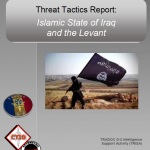
The Islamic State of Iraq and the Levant (ISIL) has risen to prominence as a danger to peace and a regional threat with global impact. This perception comes, in large measure, because of its successes in Syria and then a rapid takeover of northern Iraq. Its military victories are largely due to successful recruiting, intra-insurgent conflict, large cash reserves, and ineffective opponents. There is much to learn from how ISIL is fighting. The ready availability of recruits, many of whom are foreigners attracted to ISIL successes, and large amounts of money for payroll and purchasing war materiel are critical considerations, but it is also important to consider how ISIL is fighting on the ground.
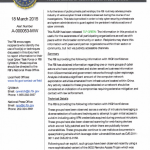
The FBI is providing the following information with HIGH confidence: The FBI has obtained information regarding one or more groups of cyber actors who have compromised and stolen sensitive business information from US commercial and government networks through cyber espionage. Analysis indicates a significant amount of the computer network exploitation activities emanated from infrastructure located within China. Any activity related to these groups detected on a network should be considered an indication of a compromise requiring extensive mitigation and contact with law enforcement.
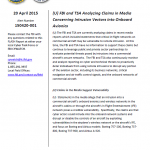
The FBI and TSA are currently analyzing claims in recent media reports which included statements that critical in-flight networks on commercial aircraft may be vulnerable to remote intrusion. At this time, the FBI and TSA have no information to support these claims but continue to leverage public and private sector partnerships to evaluate potential threats posed by intrusions into a commercial aircraft’s secure networks. The FBI and TSA also continuously monitor and analyze reporting on cyber and technical threats to proactively deter individuals from using remote intrusions to disrupt any portion of the aviation sector, including its business networks, critical navigation and air traffic control signals, and the onboard networks of commercial aircraft.
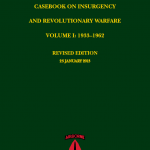
The Assessing Revolutionary and Insurgent Strategies (ARIS) series consists of a set of case studies and research conducted for the US Army Special Operations Command by the National Security Analysis Department of The Johns Hopkins University Applied Physics Laboratory. The purpose of the ARIS series is to produce a collection of academically rigorous yet operationally relevant research materials to develop and illustrate a common understanding of insurgency and revolution. This research, intended to form a bedrock body of knowledge for members of the Special Forces, will allow users to distill vast amounts of material from a wide array of campaigns and extract relevant lessons, thereby enabling the development of future doctrine, professional education, and training.

This handbook provides basic reference information on India, including its geography, history, government, military forces, and communications and transportation networks. This information is intended to familiarize military personnel with local customs and area knowledge to assist them during their assignment to India.
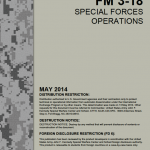
FM 3-18 is the principal manual for Special Forces (SF) doctrine. It describes SF roles, missions, capabilities, organization, mission command, employment, and sustainment operations across the range of military operations. This manual is a continuation of the doctrine established in the JP 3-05 series, ADP 3-05, ADRP 3-05, and FM 3-05.
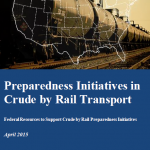
Domestic rail shipments of crude oil grew from 9,500 train car loads in 2008 to 435,560 loads in 2013—an increase of nearly 4,500 percent. The growth in shipment volume has increased the threat of spills, explosions, and other effects associated with a train derailment or crash. Recent incidents in Lac Mégantic, Quebec, Lynchburg, Virginia, Mount Carbon, West Virginia, and Galena, Illinois demonstrate the consequences of crude by rail incidents on surrounding communities and natural environments.
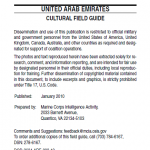
The United Arab Emirates Cultural Field Guide is designed to provide deploying military personnel an overview of UAE’s cultural terrain. In this field guide, UAE’s cultural history has been synopsized to capture the more significant aspects of the country’s cultural environment, with emphasis on factors having the greatest potential to impact operations.

This handbook provides basic reference information on the United Arab Emirates, including its geography, history, government, military forces, and communications and transportation networks. This information is intended to familiarize military personnel with local customs and area knowledge to assist them during their assignment to the United Arab Emirates.
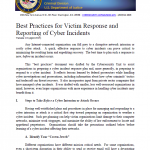
Any Internet-connected organization can fall prey to a disruptive network intrusion or costly cyber attack. A quick, effective response to cyber incidents can prove critical to minimizing the resulting harm and expediting recovery. The best time to plan such a response is now, before an incident occurs.
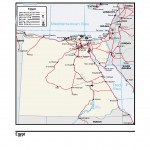
This handbook provides basic reference information on Egypt, including its geography, history, government, military forces, and communications and transportation networks. This information is intended to familiarize military personnel with local customs and area knowledge to assist them during their assignment to Egypt.
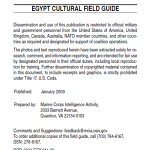
The Egypt Cultural Field Guide is designed to provide deploying military personnel an overview of Egypt’s cultural terrain. In this field guide, Egypt cultural history has been synopsized to capture the more significant aspects of the Egypt cultural environment, with emphasis on factors having the greatest potential to impact operations.
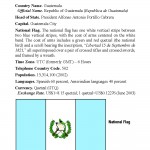
This handbook provides basic reference information on Guatemala, including its geography, history, government, military forces, and communications and transportation networks. This information is intended to familiarize military personnel with local customs and area knowledge to assist them during their assignment to Guatemala.

TRADOC Pamphlet 525-3-1 describes how future Army forces, as part of joint, interorganizational, and multinational efforts, operate to accomplish campaign objectives and protect U.S. national interests. It describes the Army’s contribution to globally integrated operations, and addresses the need for Army forces to provide foundational capabilities for the Joint Force and to project power onto land and from land across the air, maritime, space, and cyberspace domains. The Army Operating Concept guides future force development through the identification of first order capabilities that the Army must possess to accomplish missions in support of policy goals and objectives.

In concert with other agencies, the United States’ Department of Defense (DoD) is responsible for defending the U.S. homeland and U.S. interests from attack, including attacks that may occur in cyberspace. In a manner consistent with U.S. and international law, the Department of Defense seeks to deter attacks and defend the United States against any adversary that seeks to harm U.S. national interests during times of peace, crisis, or conflict. To this end the Defense Department has developed capabilities for cyber operations and is integrating those capabilities into the full array of tools that the United States government uses to defend U.S. national interests, including diplomatic, informational, military, economic, financial, and law enforcement tools.

A joint intelligence bulletin released by the Department of Homeland Security and FBI to coincide with the twentieth anniversary of the Oklahoma City Bombing warns that “domestic extremism will remain a persistent threat through the end of 2015 and beyond” with “high confidence that lone offenders and those who pursue leaderless resistance continue to pose the greatest threat of violence.” The bulletin, which is based on “recent patterns of extremist activity” often “taken by those who plan and act alone or in small cells,” states that domestic extremism “remains a persistent threat, and the United States has experienced violent ideologically-motivated criminal acts, both prior to and after the Oklahoma City attack” including “assaults, arsons, shootings, and use, or attempted use, of improvised incendiary and explosive devices, resulting in death, injury, and property damage.” Moreover, the bulletin states that “many of the same motivations used by domestic extremists to justify their criminal acts in the mid-1990s—anti-government and anti-law enforcement sentiment; racial, ethnic, and religious hatred; and advocacy of violent conspiracy theories—continue to influence domestic extremists and their targeting choices in 2015.”
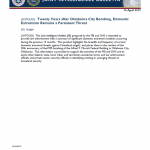
This Joint Intelligence Bulletin (JIB) prepared by the FBI and DHS is intended to provide law enforcement with a summary of significant domestic extremist incidents occurring during the previous 15 months. This product highlights the breadth and frequency of current domestic extremist threats against Homeland targets, and places them in the context of the 20th anniversary of the1995 bombing of the Alfred P. Murrah Federal Building in Oklahoma City, Oklahoma. This information is provided to support the activities of the FBI and DHS and to assist other federal, state, local, tribal, and territorial counterterrorism and law enforcement officials and private sector security officials in identifying existing or emerging threats to homeland security.
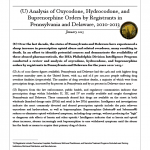
Over the last decade, the states of Pennsylvania and Delaware have experienced a sharp increase in prescription opioid abuse and related overdoses, many resulting in death. In an effort to identify potential sources and demonstrate the availability of these abused pharmaceuticals, the DEA Philadelphia Division Intelligence Program conducted a review and analysis of oxycodone, hydrocodone, and buprenorphine orders by registrants in Pennsylvania and Delaware for the years 2010-2013.
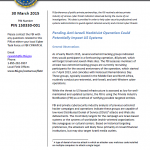
As of early March 2015, several extremist hacking groups indicated they would participate in a forthcoming operation, #OpIsrael, which will target Israeli and Jewish Web sites. The FBI assesses members of at least two extremist hacking groups are currently recruiting participants for the second anniversary of the operation, which started on 7 April 2013, and coincides with Holocaust Remembrance Day. These groups, typically located in the Middle East and North Africa, routinely conduct pro-extremist, anti-Israeli, and anti-Western cyber operations.
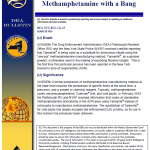
The Drug Enforcement Administration (DEA) Plattsburgh Resident Office (RO) and the New York State Police (NYSP) received credible reporting that Tannerite is being used as a substitute for ammonium nitrate using the “one-pot” methamphetamine manufacturing method. Tannerite, an explosive powder, is otherwise used in the making of exploding firearms targets. This is the first time this particular process has been reported in the New York Division’s area of responsibility (AOR).